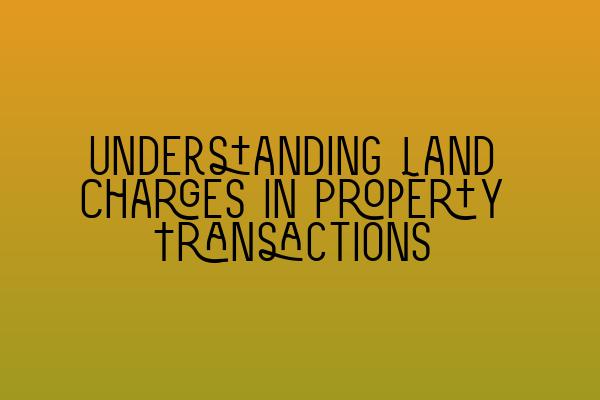Understanding Land Charges in Property Transactions
Welcome to the SQE Property Law & Land Law blog! In this post, we will be discussing an important aspect of property transactions – land charges. Whether you are a solicitor, a law student, or a property buyer/seller, understanding land charges is crucial for a successful and legally sound transaction.
What are Land Charges?
Land charges refer to any type of restriction, obligation, or interest that impacts the use or value of a property. These charges are typically registered against the property’s title and can have significant consequences for both the buyer and the seller.
There are various types of land charges, including:
- Restrictive Covenants: These are legal agreements that impose restrictions on how a property can be used or developed. Examples include restrictions on building extensions or operating certain businesses from the property.
- Equitable Charges: These are charges created by the owner of the property to secure a debt. They give the creditor an interest in the property until the debt is repaid.
- Easements: These are rights enjoyed by one property owner over another property, such as a right of way or a right to access utility services.
- Notices and Restrictions: These are restrictions registered against the property’s title to protect third-party interests, such as rights of way, planning restrictions, or conservation requirements.
It is essential to identify and understand these land charges before entering into a property transaction, as they can restrict or impede the intended use or value of the property.
Searching for Land Charges
When conducting due diligence in a property transaction, it is crucial to conduct a thorough search to identify any registered land charges.
The Land Charges Department of the Land Registry maintains a register of charges that can be searched to obtain relevant information. The search may include:
- Local Land Charges Register Search
- Bankruptcy Search
- Official Search of Whole with Priority
By conducting these searches, you can uncover any existing land charges that may affect the property in question. This knowledge allows you to make informed decisions and mitigate potential risks.
Implications of Land Charges
Understanding the implications of land charges is crucial for both buyers and sellers in a property transaction. For buyers, it ensures that they are aware of any restrictions or obligations associated with the property they are purchasing.
For sellers, knowledge of land charges allows them to address any issues or disputes relating to the charges and ensure transparency and legal compliance throughout the transaction process.
Furthermore, as a conveyancing solicitor, it is your responsibility to advise your clients on the implications of land charges and guide them through the legal complexities. By demonstrating your expertise and providing thorough explanations, you can build trust and confidence with your clients.
Conclusion
Land charges play a significant role in property transactions, and a comprehensive understanding of these charges is essential for both solicitors and property buyers/sellers. By conducting thorough searches, identifying and explaining the implications of land charges, you can ensure a smooth and legally sound transaction process.
For further resources and information on related topics, please check out the following articles:
- SQE 1 Practice Exam Questions
- SQE 1 Practice Mocks FLK1 FLK2
- SQE 2 Preparation Courses
- SQE 1 Preparation Courses
- SRA SQE Exam Dates
Thank you for reading our blog post. We hope you found it informative and valuable. If you have any questions or would like to discuss your property transaction further, please do not hesitate to contact our team at SQE Property Law & Land Law. We are here to help!
